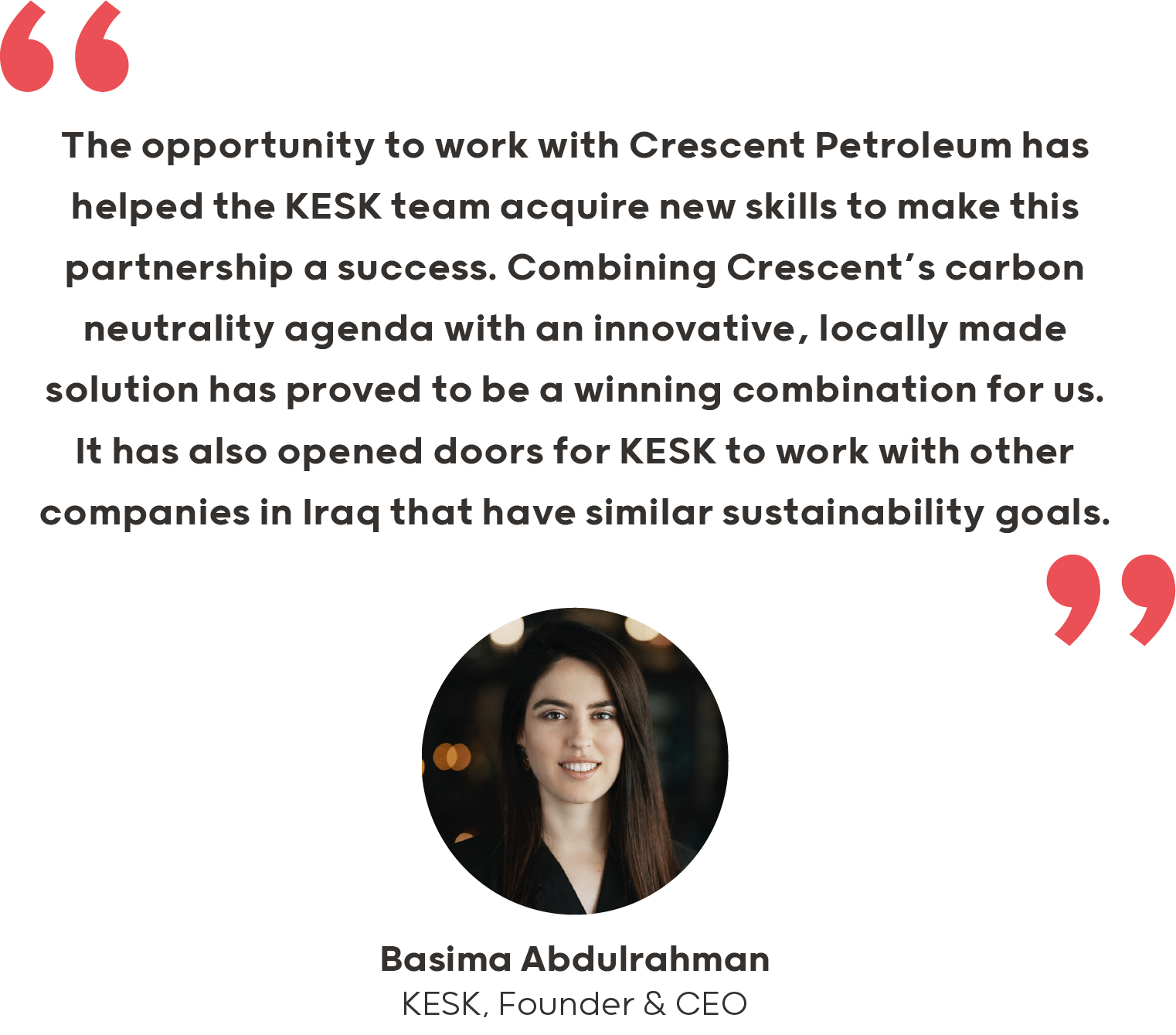Key Performance Indicators (KPIs)
Total number of
local suppliers engaged (#)
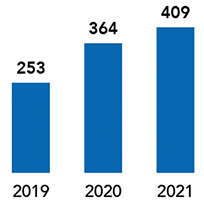
Procurement spending on
local suppliers (millions – USD)
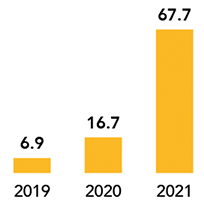
Percentage of procurement
spending on local suppliers (%)
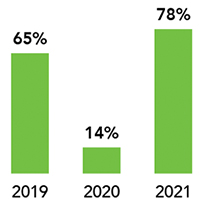
Total procurement
spending (millions – USD)
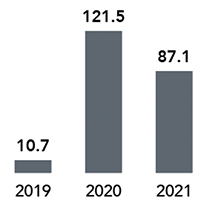
Crescent Petroleum requires all contractors and their employees, whether local or international, to participate in a social performance briefing as a prerequisite for commencing work. In addition, we include requirements related to business ethics and anti-corruption, among other things, in all procurement contracts. We are also in the process of formulating procurement related performance indicators for 2022.
Our procurement policy covers a variety of topics, including:
- Compliance with local and international laws
- QHSSE Policy & Social Performance Standards
- Sustainability
- Delegation of Authority
- Code of Ethics and Code of Conduct
- Protection of Confidential Information
- Continuous Improvement
- Procurement and Contracting Strategies
- Supplier Code of Conduct
In the more than 13 years since production operations commenced in the Kurdistan of Iraq in 2008, Pearl Petroleum has invested significant resources into the local community, and into developing a local workforce and supply chain. When coupled with high staff retention and repeated utilization of local contractors, our efforts have increased the capacity of local talent, cultivated a high-performing operational team, increased business continuity, and nurtured a culture of safety.
The KRG’s Ministry of Natural Resources (MNR) has explicit requirements regarding local contracting, which is regulated through an MNR portal in which all contractors and procurement orders must be registered and reported. To find qualified local contractors, Pearl Petroleum utilizes the MNR’s list of approved vendors and narrows the search based on the specific skillsets required for each project.
Pearl Petroleum then evaluates the suppliers based on their technical, commercial, and local content requirements. Any supplier not on the MNR pre-approved vendor list must be evaluated and approved by the MNR before they can work with us.
The MNR also has specific requirements for procurement of goods and services from Community Centered Contractors (3Cs), which are defined as companies in proximity to the asset and are eligible to receive a maximum of $250,000 per year in business. By the end of 2021, Pearl Petroleum had contracted nearly 30 3Cs, with an estimated local spend forecasted at $3-$4 million per year in the next few years, compared to $1 million per year in the past.
Case Study: Maximizing KM250 Benefits for Local Communities

Local hiring is a core priority and we actively seek talent and operators from within our communities. Major construction projects like the gas expansion works currently underway at the Khor Mor gas plant present both challenges and opportunities in this regard. To manage the challenges, we are actively working with contractors and sub-contractors to ensure they bring in local workers and equipment whenever possible, to ensure we include the local community in the benefits of the project and create common value.
Several months prior to the commencement of KM250 activities, Crescent Petroleum identified the potential challenges and opportunities, particularly related to local employment. Together with the MNR, local authorities, and major contractors, Crescent Petroleum held extensive information sessions and discussions regarding the key requirements, which mandated all unqualified job vacancies to be filled with local talent. Preference would be given to local workers if their qualifications matched the job requirements. The requirement to maximize local hiring and supply chain opportunities was communicated to each contractor and sub-contractor involved in the project.
Crescent Petroleum has leveraged the inhouse developed specialised ‘Know Your Community’ software to reliably track KM250-related community information, including recording details of local personnel capability and local equipment availability. In 2021, 705 people from within the local community were employed by the KM250 project and its contractors, cumulatively earning US$960,254. In addition, 292 items of equipment (trucks, bulldozers, excavators, buses, etc) were acquired for the KM250 project from local businesses, amounting to a total US$3.9 million investment.
Local Content
We believe in the long-term benefits of hiring local employees. As part of that commitment, we emphasise hiring and training local staff whenever possible.
In our UAE-based operations, we aim for 10% of Crescent Petroleum’s employees to be Emiratis by the end of 2026 in keeping with UAE Labour Law, up from nearly 4% today.
In the KRI, Crescent is the third largest employer for all nationalities, and the third highest local employer, with an 83% localization rate, according to the KRI’s MNR workforce report from December 2020, compared to a regional average of 77%. We have consistently maintained high localization rates and had the highest non-expatriate employment rate in the region between 2016 and 2020. Where possible, we prioritise local content and willingly invest in training and development of local talent. This has allowed us to reach 100% local employment among junior staff, while at more senior levels, our nationalization exceeds the regional average.
We achieve such high levels of localization thanks in part to the Training and Development Department, which stewards training that is customized for each role and includes one-on-one on-the-job coaching with line managers, workshops, and soft skills training. This is enabled by qualified and experienced expatriate trainers to support training programs in Khor Mor.
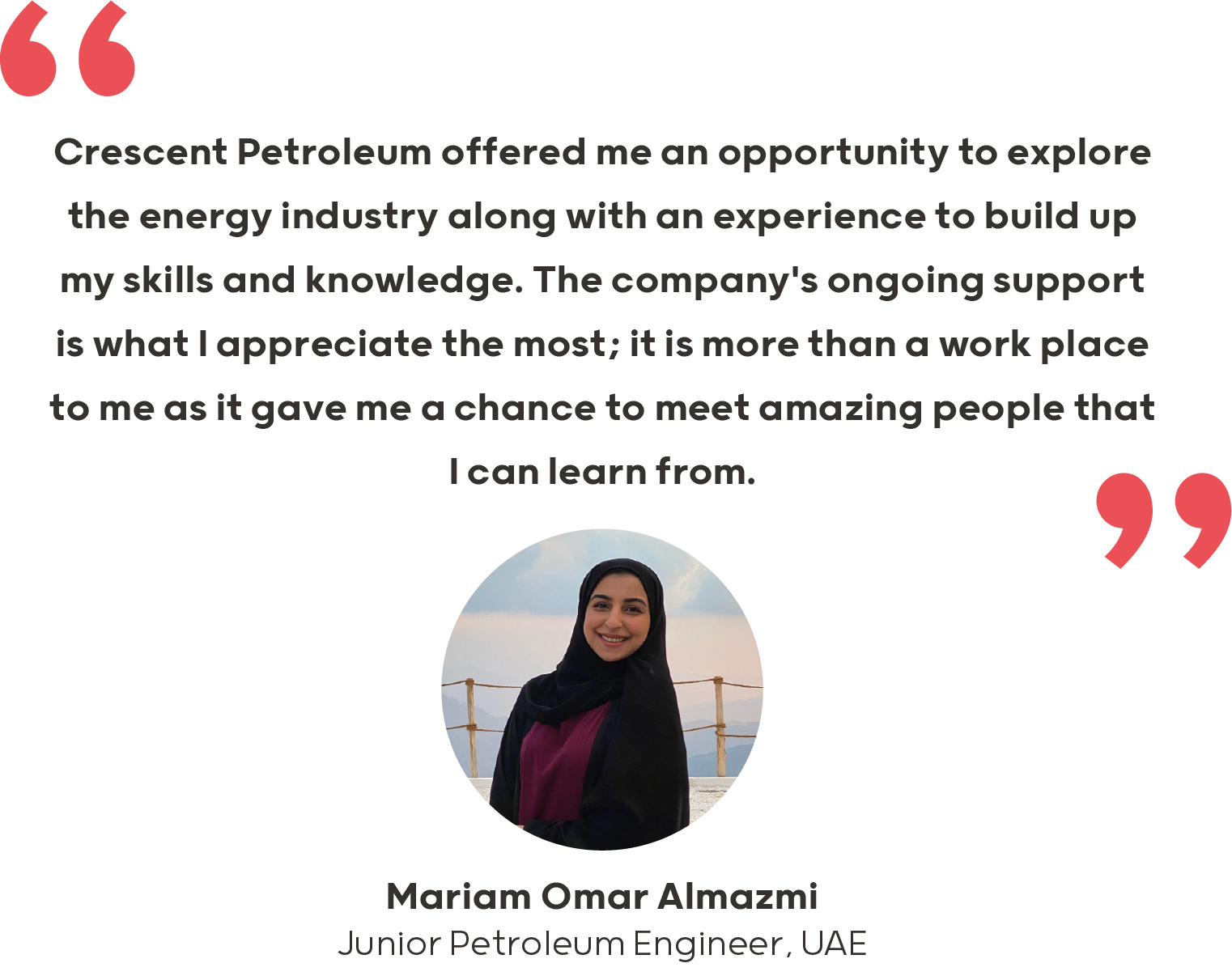
| Key Performance Indicator (KPI) | Units | 2019 | 2020 | 2021 |
|---|---|---|---|---|
| Nationalisation | ||||
| Nationals among total full-time workforce | # | 456 | 413 | 480 |
| UAE | # | 9 | 8 | 8 |
| KRI | # | 447 | 405 | 472 |
| Nationalisation (by gender) | ||||
| Female national full-time employees | # | 20 | 17 | 25 |
| UAE | # | 3 | 3 | 3 |
| KRI | # | 17 | 14 | 22 |
| Male national full-time employees | # | 402 | 385 | 455 |
| UAE | # | 6 | 5 | 5 |
| KRI | # | 396 | 380 | 450 |
| Number of national personnel in Executive Committee positions and above | ||||
| Female national full-time employees | # | 1 | 1 | 1 |
| UAE | # | 1 | 1 | 1 |
| KRI | # | 0 | 0 | 0 |
| Male national full-time employees | # | 3 | 3 | 3 |
| UAE | # | 3 | 3 | 3 |
| KRI | # | 0 | 0 | 0 |
| Percentage of national personnel in Executive Committee positions and above | ||||
| Female full-time employees | ||||
| UAE | % | 11.1% | 12.5% | 12.5% |
| KRI | % | 0% | 0% | 0% |
| Male full-time employees | ||||
| UAE | # | 33% | 38% | 38% |
| KRI | # | 0% | 0% | 0% |
Case Study:Supporting Young Female Entrepreneurs

Crescent Petroleum has collaborated with KESK, a woman-led start-up solar company based in the KRI to implement a number of sustainable energy projects starting with a solar power upgrade at our remote motorised valve stations. KESK, which means green in the Kurdish language, leverages novel solar solutions to enable green design and construction in the region.
Following a power outage at a remote motorised valve station that impacted the visibility of the SCADA system and security CCTV camera from the Khormor control system, Crescent Petroleum implemented a pilot project with KESK to use solar power as an upgrade solution. KESK has completed the upgrade’s design, installation, and commissioning with great success.
Accordingly, Crescent Petroleum has hired KESK to complete solar upgrades at some of the remote motorised valve stations. The upgrades will save energy and are projected to further reduce CO2 emissions. Throughout the project, KESK has followed Crescent Petroleum’s high-performance standards, adhered to our safety guidelines, met project deadlines, and provided all requested documents and certifications.
Through the availability of an online monitoring system, we have visibility on the health of the solar system remotely from our Khormor site, which reduces the need for routine inspection visits and provides advanced prediction indications on failures before they happen, which eventually increases the system reliability and availability.
KESK is now registered with the KRI MNR supplier database, further enabling them to gain opportunities with Crescent Petroleum and other international oil and gas companies operating in the region. We plan to partner with KESK on additional projects in the KRI, further reducing our carbon footprint while supporting an ambitious and talented local start up.
